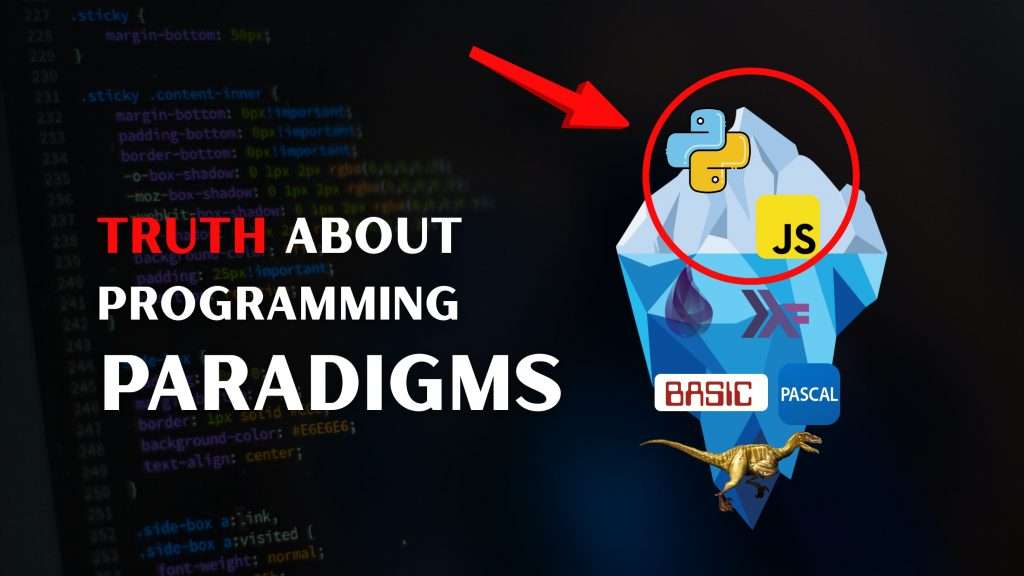If you’re still out here thinking “programming paradigms” are just fancy ways of writing if-else statements, we need to talk. Like—right now.
Most junior devs pick one paradigm, usually Object-Oriented Programming (O-O-P), and never look back. That’s like eating plain rice for life because you saw Gordon Ramsay do it once. Programming paradigms aren’t flavors—they’re frameworks for how your brain solves problems.
And guess what? If you want to survive and thrive in tech, especially in 2025, you need to explore multiple paradigms. Why? Because that’s how you stop writing spaghetti code and start thinking like an engineer.
What Is a Programming Paradigm?
Let’s keep it real. A programming paradigm is a mindset—a structured way of solving problems using code. It’s not tied to a specific language. You can write Object-Oriented code in Python or JavaScript. You can use Functional Programming in C++ if you’re stubborn enough.
But here’s the catch: each paradigm teaches you to think differently.
1. Object-Oriented Programming (O-O-P): The Corporate Darling
Let’s start with the boss’s favorite: Object-Oriented Programming.
This is the one they teach in every CS course, bootcamp, and YouTube tutorial. You break your app into objects, each with its own properties and methods. For example, a Car object has a color, speed, and a method like accelerate().
Cool, right?
Until your codebase becomes a tangle of classes like AbstractUserProfileFactoryManager. You know—when inheritance becomes generational trauma and encapsulation just means “good luck finding the bug.”
Still, O-O-P is great for structuring large applications, especially when you’re working in teams or using frameworks like Spring Boot or Django.
Learn more: The Fantasy vs. Reality of Building a SaaS
2. Functional Programming (F-P): The Brain Cleanser
Now let’s flip the script with Functional Programming (F-P). This one is all about pure functions, immutability, and avoiding side effects like it’s a toxic ex.
You don’t “do” things—you transform data.
Instead of loops, you map(), filter(), and reduce() like your life depends on it. Instead of mutating state, you pass values into a new function that spits out something new. Think React’s useReducer() but as a religion.
Great in languages like Haskell, Elixir, or even JavaScript.
Downside? You’ll stare at a nested reduce() for four hours and wonder if you’ve summoned Cthulhu.
3. Procedural Programming: The OG Hacker Mode
Procedural Programming is where most of us start. It’s not fancy. It doesn’t wear a tie. But it gets the job done.
You write step-by-step instructions: do this, then that, loop here, condition there, done. Simple. Fast. Transparent. This is how C works. This is how most scripting languages roll under the hood.
Perfect for quick scripts, command-line tools, or anything where clarity trumps structure.
And if we’re being honest? Most of your “O-O-P” code is actually procedural with a trench coat on.
Also check out: The 4 Stages of a Software Engineer
4. Logic Programming: The Brainy One
This one flips your world upside down. Logic Programming is all about defining rules and facts. You don’t say how to do something—you say what’s true, and let the machine figure it out.
Example:
- Socrates is a man.
- All men are mortal.
- Is Socrates mortal?
Answer: Yes. Boom. You didn’t program logic—you programmed knowledge.
Used in AI, natural language processing, and search. Languages like Prolog live here. Niche? Yes. But mind-expanding? Absolutely.
5. Concatenative Programming: The WTF Zone
Ever heard of Forth? Probably not. But welcome to Concatenative Programming. This is the Zen mode of paradigms. No variables. No assignments. Just functions that consume and return values from a stack.
It’s cryptic, minimal and art. You won’t use it in web apps, but you will come out with a stronger grasp of composition and data flow.
It’s like learning Latin—useless in conversation but powerful for unlocking new mental models.
Why You Should Care About Programming Paradigms
Because language is not enough. You can know Python, JavaScript, or Rust. But if you don’t understand how to think, you’re just memorizing syntax.
By learning different programming paradigms, you:
- Write better, cleaner code
- Avoid overengineering simple problems
- Understand when to use what
- Impress interviewers who ask: “Why did you use this approach?”
- Build mental flexibility that makes switching languages a breeze
TL;DR – Paradigm Shift or Perish
Programming paradigms aren’t optional anymore. If you’re serious about software development, you need to break out of the O-O-P echo chamber. Try Functional. Understand Procedural. Peek into Logic. Get weird with Concatenative. Do it not because it’s trendy, but because your brain will thank you.
Oh, and stop building Netflix clones with 40 classes and zero functions. Please.
Want to go deeper?
Check out:
- The Reality of a Day in the Life of a Software Engineer
- How to Learn Coding Fast: A Realistic Guide for Beginners
Got questions? Got rants of your own? Drop them in the comments or scream into the void. Just don’t say “I only use OOP” I might cry.







